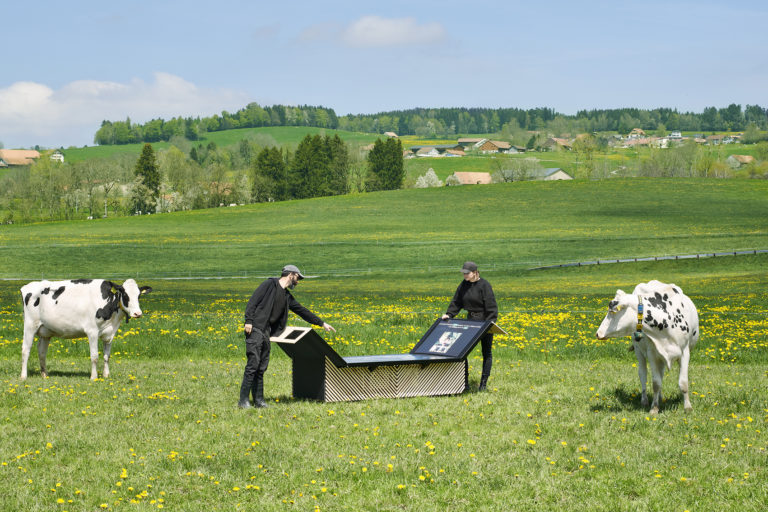Èvokâ
The sense of belonging to a physical region, such as a town, state, or country, plays a crucial role in fostering cohesion and cohabitation among citizens, driving social dynamics, promoting economic growth, and upholding democracy. This sense of belonging is closely tied to the perception of a collective identity. However, the proliferation of communities formed through social networks has diluted this notion of collective identity.
To address this challenge, the EPFL+ECAL Lab in partnership with the Cantonal and University Library of Fribourg in Switzerland, developed an experimental installation that aims to reinforce the social bonds between the citizens and their local history on an individual and collective perspective. As libraries struggle to valorise the richness of their collections, we explored how the heritage collections of the Cantonal and University Library can be used to generate new interactions with citizens, reigniting their sense of belonging to the Fribourg Canton.
The Cantonal and University Library of Fribourg holds important material related to the history and cultural identity of the Canton of Fribourg, but much of it remains unknown or hidden from the general public. Fribourg is a culturally and territorially diverse region, be it from its bilingual roots, its strong ties to the landscape and territory, or the particular symbiotic relationship between the rural and urban worlds that we can witness throughout its historic development. The cantonal library acts as mediator and keeper of these societal values. One of the key goals of the project was to valorise these relationships not only from an exhibitory approach but also contextualising them and making them relevant to the particularities of each visitor.
Perception of collective identity can be reached through a two-step process:
-
- First, by establishing a personal tie to the heritage.
- Then, by addressing the collective dimension through a multisearch and multi-user scenario.
The use of generative AI to induce narrative engagement can be beneficial but also shows current technological limitations when applied to ancient and local documents.
This experimental installation Èvokâ aims to explore how the heritage collections of the Cantonal and University Library of Fribourg can bring citizens together around a collective identity and reinforce the social cohesion process. The research project has brought together a multidisciplinary team of exhibition managers, computer scientists, designers and psychologists.
Based on emerging technologies such as artificial intelligence, Èvokâ turns archive documents such as photos, maps and posters, into a living part of Fribourg’s identity, by enabling multiple users to interact with thousands of historic documents.
To reinforce engagement of each user, the experimental device aims to induce connection with single documents at the individual level. Generative AI is used to propose narratives around pictures and suggest personal memories. Core elements are extracted from the pictures to create an ensemble of content. Two users perform in parallel the experience, face to face. The experience ends up by confronting the two ensembles, moving the scenario from individual relation to multiple representation and therefore collective identity.
Public Preview of the experimental installation Èvokâ
November 23, 2023, at 5.30 pm.
Hôtel cantonal de Fribourg
Place de l’Hôtel de Ville 2, 1700 Fribourg
Direction
Art Direction & Project Management
research assistants
Interaction Design
Ignacio Pérez in collaboration with Lara Défayes
Engineering & Technology Manager
Software Engineering
Gabriel Luthier, Ovidiu Olenici
Product Design
UX Psychology
Dr Andrea Schneider with assistance of Sofia Viola
In collaboration with
Dr Mathieu Salzmann, MER, Computer Vision Laboratory (EPFL)
EPFL Semester Projects
Chankai Wang, Robotics
Théo Gieruc, Data Science
Jean Knubel, Computer and Communication Sciences
Photography credits
© EPFL+ECAL Lab / Daniela & Tonatiuh




